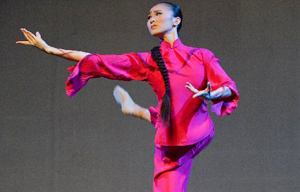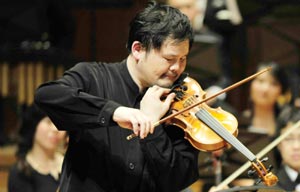
 'Taken 2' grabs movie box office crown
'Taken 2' grabs movie box office crown
 Rihanna's 'Diamonds' tops UK pop chart
Rihanna's 'Diamonds' tops UK pop chart
 Fans get look at vintage Rolling Stones
Fans get look at vintage Rolling Stones
 Celebrities attend Power of Women event
Celebrities attend Power of Women event
 Ang Lee breaks 'every rule' to make unlikely new Life of Pi film
Ang Lee breaks 'every rule' to make unlikely new Life of Pi film
 Rihanna almost thrown out of nightclub
Rihanna almost thrown out of nightclub
 'Dark Knight' wins weekend box office
'Dark Knight' wins weekend box office
 'Total Recall' stars gather in Beverly Hills
'Total Recall' stars gather in Beverly Hills
Crowd pleaser
Updated: 2013-05-17 10:52
By Hu Haidan (China Daily)
|
||||||||
While pursing her master's degree at Columbia, Lu enjoyed a life away from music.
Last fall and winter, she got the idea for planning her own concert.
Lu had been selected as a production assistant for an off-Broadway revival of Golden Child, by Chinese-American playwright David Henry Hwang.
"The most important thing I learned from that experience is how to make a show work from the very beginning," she says.
At a meeting to celebrate the show's success, Lu brought along her yangqin and played for members of New York's Signature Theater Company.
"People applauded for a long time," she recalls. "They told me they loved my performance and they said I should hold my own concert."
Lu figured it was time to apply the knowledge she had gained after more than two years in the United States. The planning began.
"I started contacting different concert halls and trying to raise money for my concert. I did face a lot of difficulty in making it finally happen, but it was definitely worth it."
By the time Tuesday night's concert at Weill Recital Hall was over, Lu felt she had left an impression on the audience, who gave her a standing ovation. "I am one step closer to my dream," she says. "The experience here has brought me to a new level of making this traditional Chinese instrument known to a Western audience."
The ambitious musician wasn't content to stop at Carnegie Hall, however. Her calendar has three other concert dates this month, the next is on May 19 when she will perform at a benefit in New Jersey for victims of the April 20 earthquake in Lushan, Sichuan province, that killed almost 200 people.
Lu is also looking for opportunities to collaborate with Eastern and Western musicians.
It is believed that China adapted the dulcimer over 400 years ago in the days of the Silk Road trading route. The yangqin's primacy in Chinese classical music is akin to the role of the piano in Western music. The Chinese instrument is performed either solo or with the erhu, pipa (both stringed) and flute-like dizi.
|
|
|
|
China National Ballet performs at Beijing Institute of Fashion Technology |
Troubled prodigy |
Most Viewed
Editor's Picks

|

|

|

|

|

|
Today's Top News
Shenzhou X astronaut gives lecture today
US told to reassess duties on Chinese paper
Chinese seek greater share of satellite market
Russia rejects Obama's nuke cut proposal
US immigration bill sees Senate breakthrough
Brazilian cities revoke fare hikes
Moody's warns on China's local govt debt
Air quality in major cities drops in May
US Weekly

|

|









